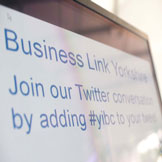Who should Twitter – and why?
3 January 2010 By Northern Lights

 Stephen Fry has again set the debate going on who should Twitter and about what. Yesterday he announced he is taking another (temporary) break to write his autobiography.
Stephen Fry has again set the debate going on who should Twitter and about what. Yesterday he announced he is taking another (temporary) break to write his autobiography.
Steve Davies (an online communications expert) has produced a list of all the journalists he could find using Twitter. I’ve used the Christmas break to go through the list and see who would be useful for us to follow.
Going through the Twitter accounts of more than 100 journalists and freelancers – including little frolics following interesting chains of conversation! – has really focused my mind about what is working and why people should be Twittering.
Steve makes it clear that it’s his own manual list and welcomes feedback – Bernard Ginns, business editor on the Yorkshire Post is missing, so it’s not exhaustive.
Here are a number of observations, which we will use to focus our own Twitter activities
- Daisy McAndrew, economics editor at ITV News, takes the prize for the Twitter with the most clarity. She gives pure news snippets as they are happening (CBI conference), poses questions (will the OFT try again on bank charges) and asks for stories (BA strike stories). There is no clutter around personal stories, snow or amusing jokes that only a few understand
- John Rentoul, chief political commentator for the Independent on Sunday has similar clarity – but only posts his blog headline and link. With titles such as ‘Quotation of the Day’ and ‘The death-wish brigade’ you won’t know what the blog is about. If you are a fan of John’s already, linking directly to the blogs may be interesting – but doesn’t feel dynamic
- Peter Barron at the Northern Echo would be interesting to follow for what is going on around Darlington. He tells you stories that he’s covering – so a PR person could offer comment from clients. There is equal amount of family in here, nice personal touch, but will it muddy why people follow him?
- Hilary Osborne, editor of guardian.co.uk/money, regularly asks questions such as ‘anyone used Twitter to find a job – DM me?’ or ‘Our PBR (pre-budget report) clinic has just started – any questions?’. There is personal stuff in here but you can skip over quickly if you don’t know what it’s about
- Declan Curry of BBC Working Lunch has an impressive following of 5,217 people. He often asks for input ‘BA strike – does this change your travel plans?’. Declan was one of my frolics and I delved into all sorts on his site – including who does Declan follow himself? Mostly fellow journalists and MPs – but also spotted the Humming Bakery, ‘the home of high quality American home-baking in London. Wondered if you can Twitter orders to them, but doesn’t look like it.
Doing a search like this, you quickly realise the importance of your profile. Sally Whittle is very clear about being ‘Freelance writer, journalist, PR and blogger’ – but nothing in her profile as to what she writes about. The weblink goes to ‘Who’s the Mummy’ and there’s a lot about her children on Twitter – so looks like she freelances on being a parent. She has built a following of 2,000 plus.
Emma Lunn, another on the freelance list, has no profile or link to a website, but it is very clear that she writes about property and finance. Frequent requests for help on the lines of ‘need a property expert who can tip a hotspot for 2010 up north somewhere’.
In contrast to these, Oliver Shah has his location, London, link to his website and crystal clear profile ‘I’m a freelance journalist working in London covering business, technology and politics. No trawling through the Tweets to guess at what Oliver writes about.
What can business people take from this?
- Why are you Twittering? If you want businesses or others to contact you, make sure you have a clear profile, including your location (the freelance journalists are based in China, Muscat and East Anglia)
- Is your Twitter for friends or business? Don’t clutter the two. Keep it clear for the people you want to follow you
- Disasters and crises are probably just reason to go ‘off piste’ occasionally (‘anyone in Preston – what’s the snow like there?’) but get back to your core quickly
- What do you want from Twitter? Have a clear focus as to your target audience – and make your Twitter content useful for them
- What do your followers want from you? Lawyers could announce court decisions, give views on legal cases; academics interpret issues in the news or add information from their research; those in the public sector could interpret government decisions or advise on help available for particular situations
- Who you are following may give away a lot about your personal life!
